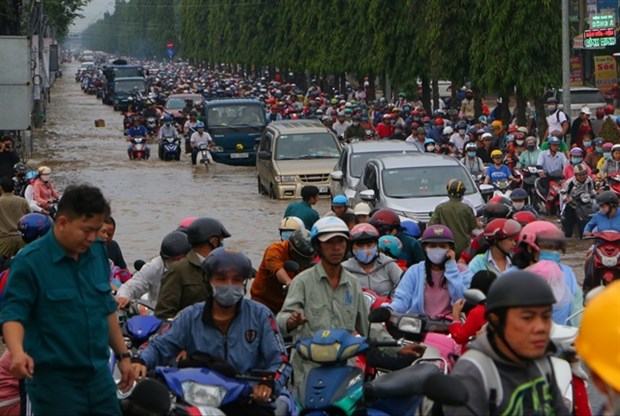
Nguyen Van Cu street in Can Tho city’s Ninh Kieu district was flooded by high tides in October last year. High tides and land subsidence have contributed to flooding in the city in recent years (Photo: VNA)
The delta, the country’s largest rice, fruit and seafood producer, is facing a land subsidence rate of 1 cm per year, with some areas reaching a rate of 5.7 cm, according to the Ministry of Natural Resources and Environment.
Can Tho city has the highest rate of land subsidence, with more than 5 cm in most areas during the 2015 – 19 period.
Speaking at a seminar held in Can Tho ealier this week, Tran Quang Khai of the Ho Chi Minh City University of Technology’s Water Management and Climate Change Centre, said that if Can Tho continued exploiting groundwater, most areas would become lower than sea level by 2100.
Flooding and high tides will also become more severe, he said.
Construction projects in Can Tho have also worsened land subsidence.
"The delta exploits 2 million cu.m of groundwater a day, according to reports, but the reports do not include all household-bore wells, so the volume is actually higher," said Khai.
The main causes for subsidence are reduced sediment supply due to upstream dams, river sand mining, and groundwater exploitation, seminar participants said.
Nguyen Huu Thien, an independent expert on Mekong Delta ecology, said the cost of using surface water is higher than that of groundwater.
He said the delta should develop zoning of areas where groundwater exploitation should be restricted.
Seminar participants said that raising public awareness about the problem is needed and that the surface water and rain water should be used more.
Strict legal regulations to protect groundwater resources in the delta are also needed, they said.
Nguyen Thuc Hien, Vice Chairman of the Can Tho People’s Committee, said the city has zoned areas where groundwater exploitation is restricted and has taken measures to prevent the practice./.
State’s personnel affairs to be tabled at National Assembly next week
The National Assembly (NA) is set to consider personnel issues related to key positions in the State apparatus during the second working week of its 11th session, reported VNA.

A plenary sitting in the 11th session of the 14th National Assembly (Photo: VNA)
On March 29 and the next day’s morning, legislators will discuss the reports on the performance during 2016-2021 by the State President, the Government, the Supreme People’s Court, and the Supreme People’s Procuracy.
This plenary sitting will be broadcast live on television and radio.
The parliament is scheduled to conduct procedures to relieve the Chair of the NA, the Chair of the National Election Council, some vice chairs of the NA, the Prime Minister, and the State President.
After that, it will elect a new leader for the NA, a new chairperson for the National Election Council, along with some new vice chairs of the NA.
During the week, deputies will also scrutinise the report on the State Audit Office’s performance in the 2016-2021 tenure, the number of full-time deputies of the Hanoi People’s Council for 2021-2026, and the candidacy for the State President position.
The 11th session, opened Hanoi on March 24, is the last of the 14th-tenure parliament.
Cross-border control tightened against coronavirus threats
According to the National Steering Committee on COVID-19 Prevention and Control, cross-border control should be tightened to prevent the SARS-CoV-2 virus entering the territory.

Border guards have increased patrols to detect illegal entrants.
The officials raised concerns about the possibility of virus transmission within the community if illegal entrants carrying the virus are not detected in a timely manner, reported VOV.
“Those who illegally enter the territory must be strictly dealt with according to the law,” stressed Deputy Prime Minister Vu Duc Dam, who is also head of the National Steering Committee on COVID-19 Prevention and Control.
“It is impossible for few individuals to cause great harm to the whole society if the epidemic spreads,” said Dam.
He requested local police to encourage families with relatives living abroad to return to their homeland legally if they wish.
He also called on local residents to notify authorities of the presence of those who come back from the coronavirus hit areas or from abroad without declarations according to regulations.
Vietnam on March 26 confirmed two coronavirus infections that had illegally entered the territory from a neighbouring country.
Deputy PM Vu Duc Dam asked all healthcare facilities, schools, accommodation establishments, factories, wet markets, supermarkets, bus stations, as well as residents to remain highly vigilant and strictly implement anti-coronavirus measures.
Given the complex development of the virus, localities should restrict the organization of crowded events, especially weddings and funerals, in order to minimize the risk of infection if an epidemic occurs, said Dam.
During another meeting on the same day, Minister of Health Nguyen Thanh Long warned about the possibility of another coronavirus outbreak in Vietnam if anti-coronavirus measures are not tightened./.